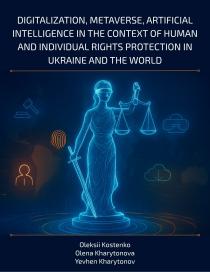METAVERSE: THE DIGITAL LAW OF THE DIGITAL AGE
Synopsis
The rapid development of information technologies has led to significant changes in social, economic and legal processes, and has posed new challenges to traditional legal systems. In particular, the exponential growth of digital flows, the emergence of non-classical subjects of law – such as autonomous algorithms - and the intense dynamics of innovation have revealed the imperfections of existing regulatory mechanisms.
In response to these transformations, the author proposes the concept of the Digital Code Model, a systemic regulatory document adapted to the needs of digital interaction within the Society 5.0 paradigm. The model is modular in nature, which ensures its flexibility, compatibility with international standards, and ability to adapt evolutionarily.
The key functional elements: algorithmic updating of norms, automated legal monitoring using artificial intelligence technologies, as well as integrated mechanisms for ensuring a balance between technological progress, human rights and the state’s security needs.
Particular attention is paid to the model's architecture and implementation strategy, which envisions its gradual integration into national and transnational legal systems. This approach makes it possible to create a stable, effective and promising basis for digital governance that can meet the requirements of the modern technological environment.










